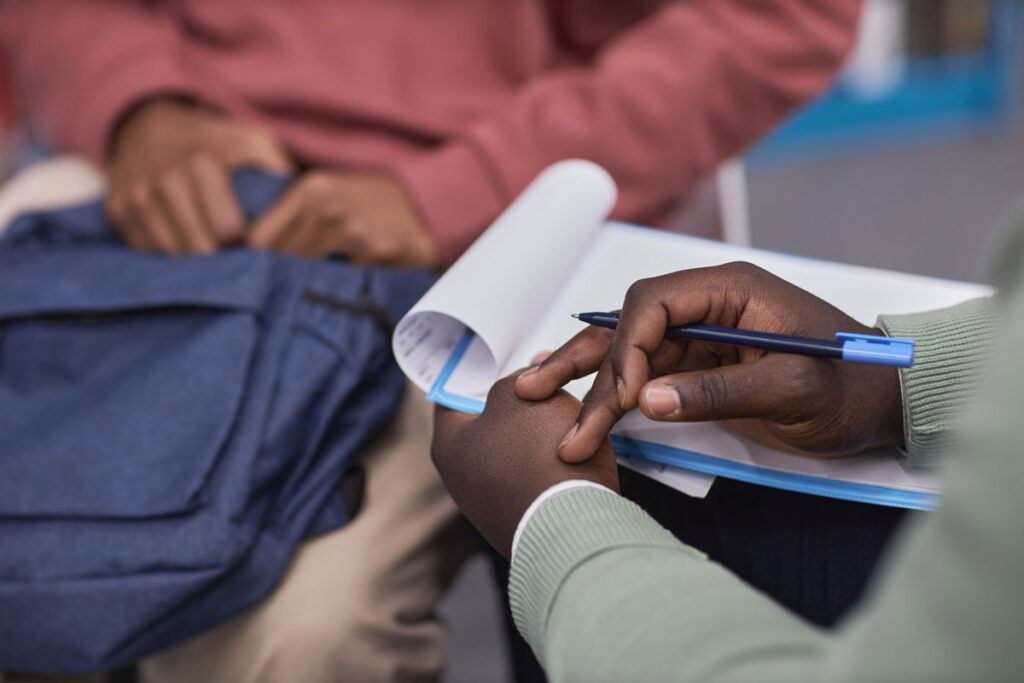Compassion fatigue is a term used “to describe how educators internalize or absorb their students’ trauma to the point of emotional and even physical exhaustion,” according to the National Education Association. The impacts of compassion fatigue and vicarious trauma don’t stop at educators, but extends to any individual throughout the institution who provides support to the learners.
The COVID-19 pandemic put a magnifying glass on helping professions’ consistent fight against the exhaustion that coincides with emotionally and physically stressful situations of those receiving care, and has led to a surge in calls for better working conditions, and better tools to combat compassion fatigue from those who make up the helping professions.
What causes Compassion Fatigue & Burnout?
Identifying the root causes can help us better overcome compassion fatigue and burnout. Some factors include:
- Traumatic grief and loss in the workplace
- Incidents of loss or violence in the workplace can cause members of those communities to feel unsafe, which over time can cause higher stress and feelings of insecurity.
- Excessive workload
- Individuals who are forced to work beyond their capacity due to a staffing shortage or social expectations shoulder this burden.
- Values mismatch
- When our individual values are not aligned with the values of the organization we work for, it can cause a disconnect that can affect productivity and foster a feeling of personal failure.
- Secondary trauma exposure
- Vicarious trauma describes the potential impact of working with individuals who have experienced trauma.
- Systems failure
- You may experience moral distress from complying with the organization’s rules, laws and policies although you may actually oppose them.
How does it affect our mental health?
Compassion fatigue and burnout can cause us to have a diminished or an exaggerated emotional response to certain situations and individuals. When we struggle to empathize with others, our relationships may suffer as a result. If left unchecked, they can also create issues with sleep, communication and overall functioning.
According to the American Psychological Associations 2021 Work and Well-Being Survey, 79% of workers experienced work related stress within the month prior to the survey. Nearly 60% of workers reported negative impacts of work-related stress including lack of motivation and energy, low effort at work, cognitive weariness, emotional and even physical exhaustion.
The most common signs of compassion fatigue and burnout are:
- Mental exhaustion
- Reduced capacity for empathy
- Increased irritability
- Anxiety
- Depression
What can we do to fight it?
Here are some ways to combat compassion fatigue and burnout. It is important to find a balance that works best for you.
Find a support system. Seeking help is a sign of strength, not weakness. Discussing your feelings with a trusted confidante can provide an opening to begin processing them. Guided supervision or finding a group of colleagues who would benefit from similar support can inspire camaraderie and build trust in the workplace. If a support system feels out of reach, consider seeking professional care. (Everyone, including mental health professionals, deserve space to process their emotions.)
Advocate and take action. Identifying where institutions are failing you as a professional and working to advocate for changes in your specific workplace is both positive and proactive. Advocating for larger-scale change could not only benefit you but others as well. It may lead to a systemic solution.
Create healthy coping strategies. Oftentimes, self-care is the prescribed cure. You may need to sit down, figure out what isn’t working and restructure the things you can do to heal. It will help to reflect on how effective your coping strategies are. Separate distractions from the activities that best serve you in your recovery.
For further guidance, The Cleveland Clinic lists a dozen strategies to combat compassion fatigue and burnout, as well as tips on identifying when you may be dealing with burnout versus other potential issues.
 Written by David Akers, M.Ed.
Written by David Akers, M.Ed.
David is the Equity, Diversity, and Inclusion program coordinator for the Illinois Behavioral Health Workforce Center at SIU School of Medicine. They are a counselor by training and are completing their Master’s in Public Health. David’s passions lie in promoting health equity, improving health outcomes for minoritized communities, and ensuring our health care workforce is trained to provide culturally proficient care and is reflective of the communities it serves.

